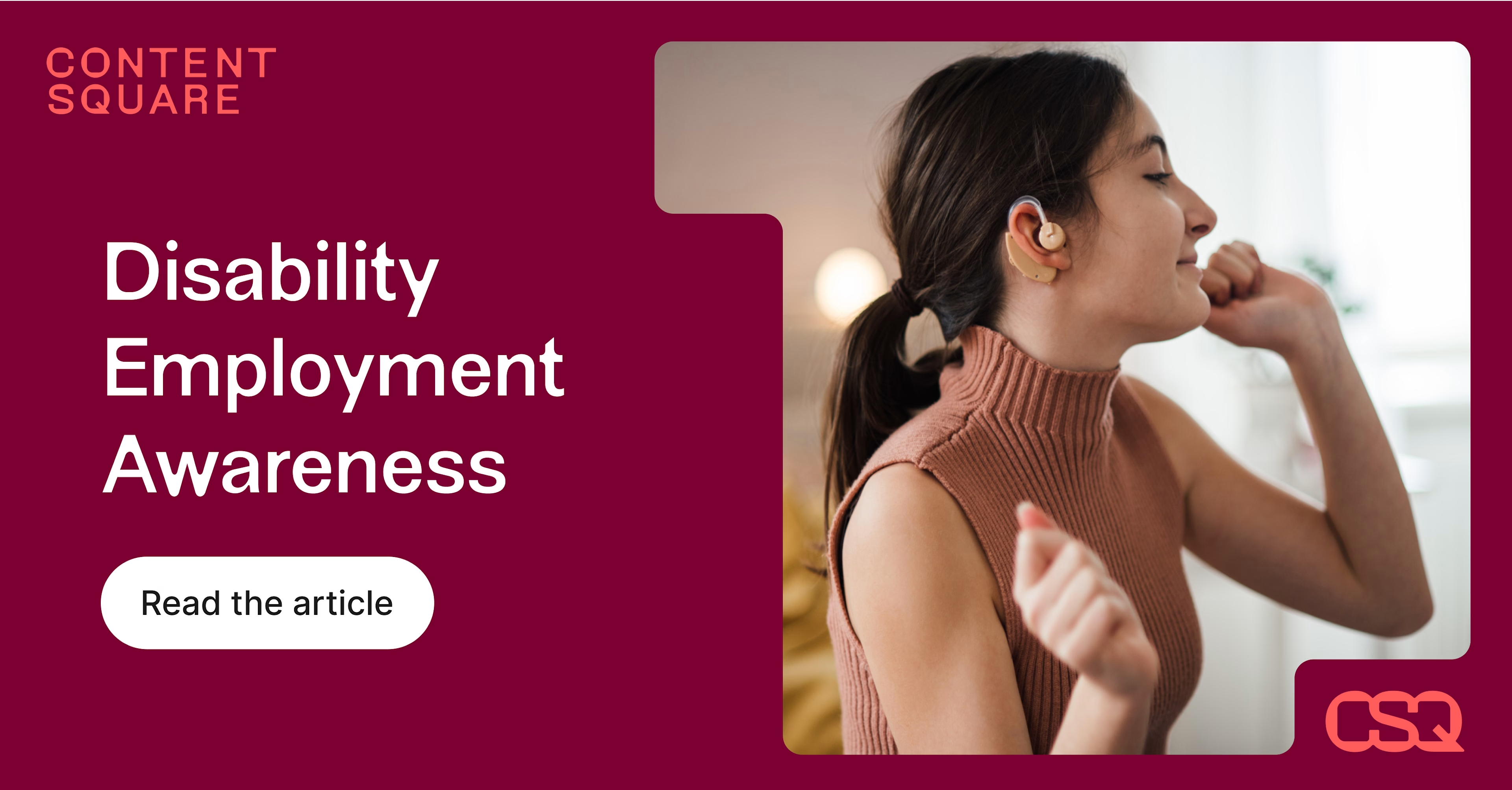October and November highlight the importance of disability inclusion, from US National Disability Employment Awareness Month to European Disability Employment Week. Yet, too many organizations still make hiring decisions based on outdated assumptions about people with disabilities, costing them innovation, revenue, and competitive edge.

At Contentsquare, our experience with inclusive hiring proves many common beliefs about disability employment simply aren’t true. As we work to build a culture where everyone can thrive, let’s challenge these myths with facts.
Ready to build a more inclusive workplace? To learn more about the Contentsquare culture and our career opportunities, check out our careers page. |
Myth #1: "The talent pool isn't large enough to matter"
This assumption ignores massive numbers. According to the World Bank, over 1 billion people globally live with disabilities, representing an enormous pool of skilled professionals across every industry. Yet employment rates remain disappointingly low, creating an opportunity for forward-thinking organizations to access overlooked talent.
At Contentsquare, we're committed to understanding and engaging this talent pool. Through voluntary diversity surveys deployed across our global hiring process, we track whether candidates with disabilities are seeing our open positions and applying for them. This data helps us ensure we're actively identifying barriers and giving every candidate a fair chance to succeed during the hiring process.
Myth #2: "Performance and reliability will suffer"
Data tells a different story. Accenture shows employees with disabilities often have:
Higher retention rates
Equal or better job performance
Strong attendance records
Enhanced problem-solving skills from different perspectives
Companies embracing inclusive hiring see measurable benefits in innovation and financial performance, but success depends on creating conditions where employees can leverage their strengths. Fortunately, most of these conditions cost little to nothing.
Myth #3: "Accommodations are expensive and disruptive"
Our experience at Contentsquare, where we follow ADA guidelines as our global standard, proves otherwise. Most workplace accommodations are simple adjustments like flexible scheduling, alternative document formats, or remote work options, which are things many companies already offer. The Job Accommodation Network consistently shows the majority cost under $500, with many costing nothing at all.
We've built accessibility into how we work: closed captions at all company events, access to specialized equipment, and flexibility for people to work in ways that suit them best. During hiring, we provide extended time for assignments, assistive technology for interviews, and alternative assessment formats, if needed. These adjustments ensure we're evaluating all talent fairly.
💡 Innovation insight: Accessibility needs have driven many technological breakthroughs. The typewriter was developed to help blind individuals write legibly, early telephone technology was influenced by Alexander Graham Bell's work with the deaf community, and email emerged partly from the need for text-based communication. What started as accessibility solutions transformed how everyone communicates and works. |
Myth #4: "It's mainly about legal compliance"
While avoiding the 4,000+ accessibility lawsuits filed in 2024 matters, the business case extends far beyond compliance. The Return on Disability Group shows organizations prioritizing inclusion see benefits in brand reputation, customer loyalty, and market reach. When 92% of consumers prefer accessible businesses, inclusion becomes a competitive advantage.
At Contentsquare, we’ve learned that accessibility isn’t just about checking boxes. When we design with inclusion in mind, everyone benefits. For example, enabling closed captions in All Hands meetings doesn’t just help colleagues with hearing impairments; it also makes it easier for our global team to follow along, especially when speakers have different accents. Similarly, sharing meeting agendas and action items in advance, originally to support neurodivergent colleagues, now helps all employees show up better prepared and enables those who can’t join live to participate asynchronously.
Our commitment to accessibility also extends beyond our own organization. Through the Contentsquare Foundation, we raise awareness about legal accessibility standards and the importance of building accessible digital experiences for all. Initiatives like the Barometer report help companies understand the legal landscape while reinforcing that a more accessible digital world improves the experience for everyone.
That’s the power of universal design: accommodations for some lead to better, more productive experiences for all.
Myth #5: "Our company culture isn't suited for this"
Building an accessible culture means more than just adapting for a few individuals. We’ve embedded inclusion into our hiring and daily practices: diverse interview panels, accessible application systems, multiple interview formats, and clear accommodation policies. These approaches create better experiences for every candidate and employee, and reflect our core values of being Understanding and Deliberate.
💡 At Contentsquare: Our ADAPT (Abled and Disabled Allies Partnering Together) ERG demonstrates how employee-led initiatives can support cultural change. By providing neurodiversity education, building community between disabled employees and allies, and offering resources for inclusive practices, ADAPT helps us move beyond myths to create real workplace transformation. |
The path forward
The talent exists. The business case is proven. The only barrier remaining is outdated thinking that prevents organizations from accessing this valuable talent pool.
To build inclusive workplaces that work:
Acknowledge the opportunity:
Recognize that disability inclusion is strategic talent acquisition
Understand that accessible practices benefit everyone, not just people with disabilities
Take concrete action:
Review hiring processes for accessibility barriers
Implement inclusive onboarding experiences
Create workplace cultures where diverse perspectives, and ways of working, drive innovation
Measure progress toward meaningful inclusion goals
Lead by example:
Challenge assumptions when they arise in hiring discussions
Build inclusive systems, not one-off accommodations. Share success stories that demonstrate the value of your inclusive practices, and focus on creating the conditions needed for people with diverse needs to thrive
Support employee resource groups that build community and awareness
Learn more about the Contentsquare culture and our career opportunities |
Contentsquare has been in business for 13 years since its founding in Paris in 2012. We offer a complete understanding of customer experiences across all touchpoints, our platform is designed to help businesses understand how users interact with their websites and mobile applications.
